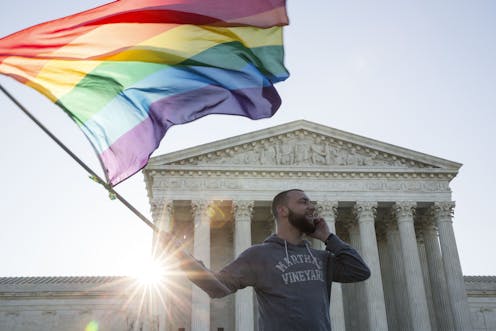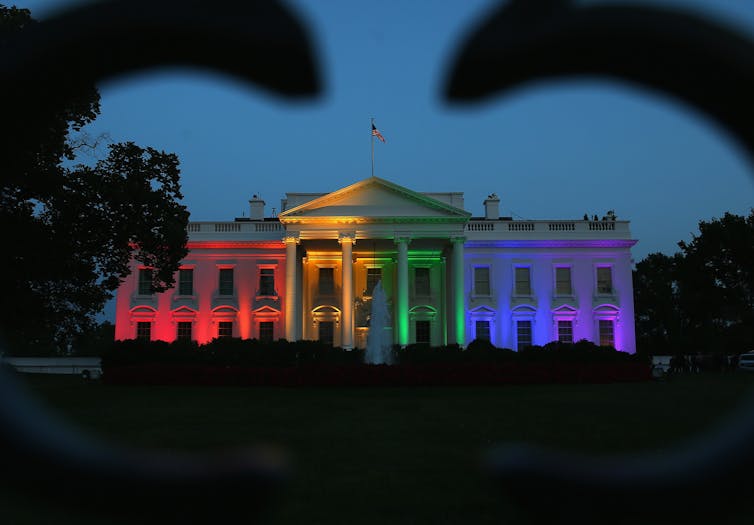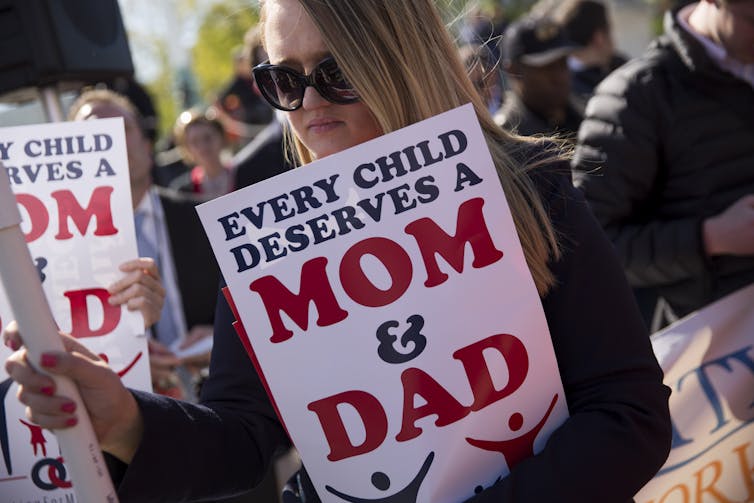Congress is considering making same-sex marriage federal law – a political scientist explains how th
The U.S. House of Representatives recently voted for a bill that would federally protect same-sex marriage – and 47 Republicans signed on, too. Same-sex marriage isn’t the partisan issue it once was.

While public opinion and different state laws on abortion rights are sharply dividing the country, there’s growing indication that most people agree on another once-controversial topic – protecting same-sex marriage.
The U.S. House of Representatives voted on July 19, 2022, to enshrine same-sex marriage into law with a bipartisan vote – all 220 Democratic representatives voted in favor, joined by 47 Republican colleagues.
The Respect for Marriage Act, as it is called, would repeal the 1996 Defense of Marriage Act, a federal law that defines marriage as the legal union between a man and a woman.
The bill faces an uncertain fate in the closely divided Senate – so far, five Republicans out of 50 have said they would vote for it. Democratic Senate Majority Leader Chuck Schumer has said the Senate will vote on the bill once it has 10 Republican votes.
I am a scholar of political behavior and history in the U.S. I believe that it’s important to understand that the bipartisan support for this bill marks a significant political transformation on same-sex marriage, which was used as a contentious point separating Democrats and Republicans roughly 15 to 20 years ago.
But over the past several years, same-sex marriage has become less politically divisive and gained more public approval, driven in part by former President Donald Trump’s general acceptance of the practice. This environment made it politically safe for nearly a quarter of Republican House members to vote to protect this right under federal law.

What makes opinions change?
Seventy-one percent of Americans say they support legal same-sex marriage, according to a July 2022 Gallup poll. In 1996, when Gallup first polled about same-sex marriage, 27% supported legalization of same-sex marriage.
This shift in public opinion has happened despite increasing polarization in the U.S. about gun control, racial justice and climate change.
What becomes, remains or ceases to be a divisive political issue in the U.S. over time depends on many factors. Changes to laws, shifting cultural norms and technological progress can all shape political controversies.
My research, for example, explores how Mormons in Utah territory – what would later become Utah state – were denied statehood by Congress until they gave up their religious belief in polygamy. Polygamy was outlawed under U.S. law, and known polygamists were excluded from voting and holding office. In the 1880s, an estimated 20% to 30% of Mormons practiced polygamy. Yet, political pressure led the Mormon Church president in 1890 to announce that polygamy would no longer be sanctioned.
In 2011, 86% of Mormon adults reported that they consider polygamy morally wrong, nearly in line with general public opinion.
Many political leaders, both on the left and right, were also largely hostile to same-sex marriage until the early 2010s.
A rising controversy
In 1993, the Hawaii Supreme Court ruled that the state must have a compelling reason to ban same-sex marriage, after a gay male couple and two lesbian couples filed a suit that a state ban on same-sex marriage violated their privacy and equal protection rights.
Concern among conservatives that this legal reasoning would lead the Supreme Court to acknowledge a right to same-sex marriage led to a Republican Senator and Congressman introducing the Defense of Marriage Act.
President Bill Clinton signed the bill in 1996 after 342 – or 78% – of House members and 85 senators voted for it. Polling at the time showed support among the general population for same-sex marriage was 27% overall, including just 33% among Democrats.
Seven years later, in 2003, the Massachusetts Supreme Court struck down a state ban on same-sex marriage. With a strong majority nationally of Republicans and independents opposed to same-sex marriage, former President George W. Bush used conservative reactions to that decision to encourage voter turnout in 2004. Bush’s campaign highlighted state amendments to ban same-sex marriage, all of which easily passed.
Although voters prioritized other issues in the 2004 elections, the opposition to same-sex marriage helped Bush win reelection, while Republicans picked up seats in both the House and Senate.
A political change
The legal and political landscape on same-sex marriage became much more liberal in the years following 2004.
In 2008, state courts in California and Connecticut struck down bans on same-sex marriage. Vermont became the first state in 2009 to pass legislation and legalize same-sex marriage.
A major national shift occurred in 2012 when then-Vice President Joe Biden and President Barack Obama openly supported same-sex marriage. This was a major change for both men. Biden had voted in favor of the Defense of Marriage Actin 1996. Obama publicly supported marriage as being between a man and a woman in his 2004 senatorial campaign.
In 2015, the Supreme Court struck down all national and state restrictions on same-sex marriage, making same-sex marriage the law of the land.

The Trump effect
The lack of attention Trump paid to same-sex marriage is one factor that contributed to it becoming a less divisive issue. While Trump’s actual record on LBGTQ rights generally aligns with conservative Christian values, Trump had said in 2016 that he was “fine” with legalizing same-sex marriage.
Still, despite the legality of same-sex marriage, many conservative Midwestern and Southern states deny other legal protections to LBGTQ persons. Twenty-nine states still allow licensed professionals to conduct youth gay-conversion therapy, a discredited process to convert LGBTQ people into no longer being queer.
More than 20 states allow discrimination in both housing and public accommodations based on sexual orientation.

Respect for marriage
Some Republican leaders have grown bolder in their opposition to same-sex marriage since the Supreme Court overturned the constitutional right to abortion in the Dobbs v. Jackson Women’s Health Organization decision.
Other Republicans have said that codifying federal law same-sex marriage is not necessary since they don’t believe the Supreme Court is likely to overturn federal protections for same-sex marriage.
Democrats first moved to protect same-sex marriage in federal law because Supreme Court Justice Clarence Thomas wrote in a concurring opinion in the Dobbs case that the court should reconsider, “all of this Court’s substantive due process precedents, including Griswold, Lawrence, and Obergefell,” the latter being the case that legalized same-sex marriage.
But despite public opinion polls showing that most people favor legalizing same-sex marriage – including nearly half of Republicans – the issue could still be a liability for Republican politicians. They have to answer to their core conservative constituents who largely oppose the practice. This could mean that Senate Republicans may have to consider splitting from their own base, or stepping away from moderate voters.
Tim Lindberg does not work for, consult, own shares in or receive funding from any company or organization that would benefit from this article, and has disclosed no relevant affiliations beyond their academic appointment.
Read These Next
Why US third parties perform best in the Northeast
Many Americans are unhappy with the two major parties but seldom support alternatives. New England is…
Abortion laws show that public policy doesn’t always line up with public opinion
Polls indicate majority support for abortion rights in most states, but laws differ greatly between…
Detroit was once home to 18 Black-led hospitals – here’s how to understand their rise and fall
In the early 20th century, Detroit’s Black medical professionals created a network of health care…






